Northco Company - Bankable renewable energy solution
About Pitch Hub Innovate4Climate 2018:
The Pitch Hub provided a dynamic space to "pitch" to potential investors and seek feedback from leaders in climate investment, finance, and markets.
Northco Company - Bankable renewable energy solution
About Pitch Hub Innovate4Climate 2018:
The Pitch Hub provided a dynamic space to "pitch" to potential investors and seek feedback from leaders in climate investment, finance, and markets.
Tugliq Energy & Hydro Quebec - David and Goliath join forces to reshape the energy landscape of remote communities.
About Pitch Hub Innovate4Climate 2018:
The Pitch Hub provided a dynamic space to "pitch" to potential investors and seek feedback from leaders in climate investment, finance, and markets.
Energy Efficiency Services Limited (EESL) - Scaling Up Transformative Investments through Innovation and Collaboration #Invest4Climate
About Pitch Hub Innovate4Climate 2018:
The Pitch Hub provided a dynamic space to "pitch" to potential investors and seek feedback from leaders in climate investment, finance, and markets.
Energy Efficiency Services Limited (EESL) - Getting Smart about Cooling - Scaling up climate action through collaboration and investment in clean and efficient cooling #Invest4Climate
About Pitch Hub Innovate4Climate 2018:
The Pitch Hub provided a dynamic space to "pitch" to potential investors and seek feedback from leaders in climate investment, finance, and markets.
EcoLigo - Closing the finance gap for solar projects in emerging markets
About Pitch Hub Innovate4Climate 2018:
The Pitch Hub provided a dynamic space to "pitch" to potential investors and seek feedback from leaders in climate investment, finance, and markets.
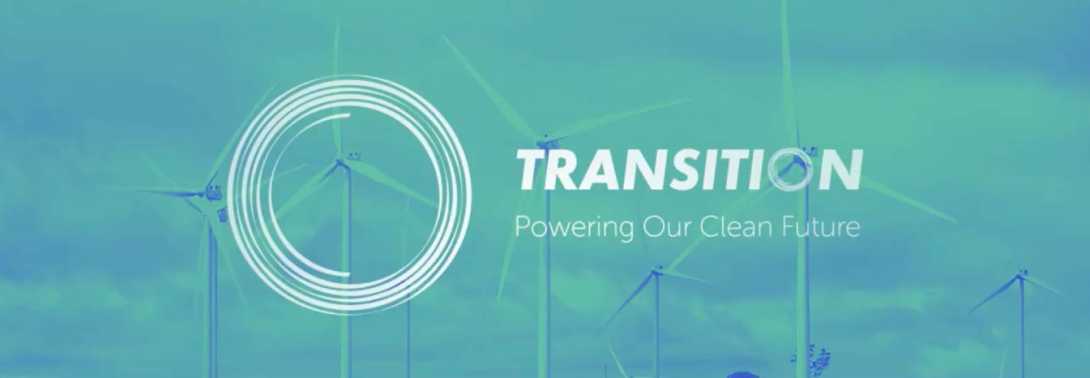
Under the High Patronage of His Serene Highness, Prince Albert II, Transition Monaco Forum, a new global platform committed to accelerating the transition towards a clean future across all sectors and industries, will convene global business leaders, policymakers, cleantech experts, and innovators at The Grimaldi Forum in Monaco from June 26-27, 2018.
In response to commitments made during COP 21 and the One Planet Summit, and by developing new business models combining prosperity and sustainability as well as identifying the latest technologies and implementing initiatives for companies to pioneer this change, Transition Monaco Forum aims to accelerate the ecological and energy transition.
The objectives of this exciting new initiative are to form a European hub of investors dedicated to financing the ecological and energy transition and to mobilize key stakeholders across all sectors to find concrete solutions for businesses to develop sustainably.
Gathered in Monaco, a country leading the energy transition, participants will debate the five critical enablers of the cleantech ecosystem: finance, regulation, innovation, cities and territories and new stakeholders.

 H.S.H. Prince Albert II of Monaco (Monaco)
H.S.H. Prince Albert II of Monaco (Monaco)
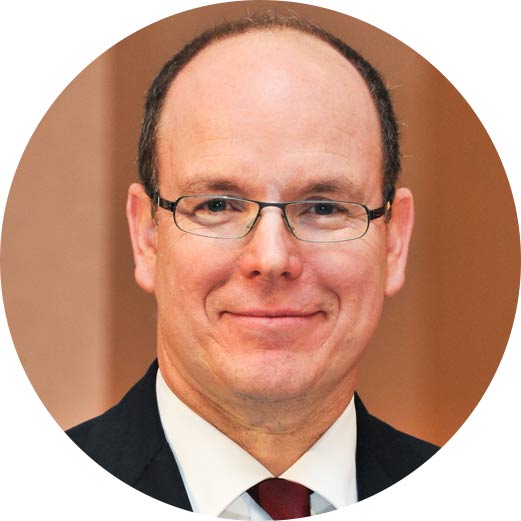

 Arnold Schwarzenegger, Founder, R20 Regions of Climate Action (USA)
Arnold Schwarzenegger, Founder, R20 Regions of Climate Action (USA)
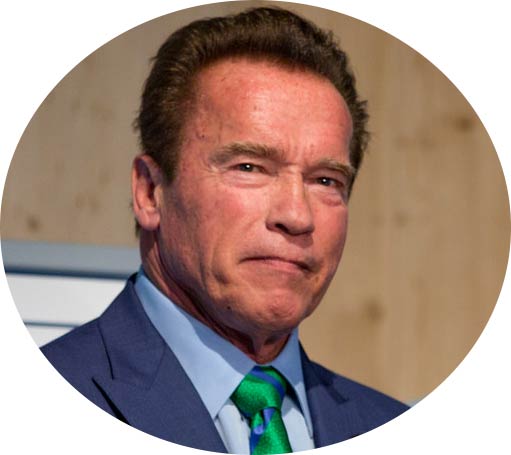

 Alzbeta Klein, Director and Global Head, Climate Business, International Finance Corporation (IFC) (USA)
Alzbeta Klein, Director and Global Head, Climate Business, International Finance Corporation (IFC) (USA)


 Anne Hidalgo, Mayor of Paris, Chair of C40 Cities Climate Leadership Group (France)
Anne Hidalgo, Mayor of Paris, Chair of C40 Cities Climate Leadership Group (France)


 Olivier Biancarelli, General Director, Tractabel-Engie (France)
Olivier Biancarelli, General Director, Tractabel-Engie (France)

 Erik Brandsma, General Director, Swedish Energy (Sweden)
Erik Brandsma, General Director, Swedish Energy (Sweden)

 Graciela Chichilniski, Economist and Nobel Prize Winner, Columbia University (USA)
Graciela Chichilniski, Economist and Nobel Prize Winner, Columbia University (USA)

 Filipe de Botton, CEO, Logoplaste (Portugal)
Filipe de Botton, CEO, Logoplaste (Portugal)

 Matthieu de Chanville, Deputy Head of Alliance Ventures, Renault-Nissan-Mitsubishi (France)
Matthieu de Chanville, Deputy Head of Alliance Ventures, Renault-Nissan-Mitsubishi (France)

 Jérôme Delafosse, Explorer and Expedition Leader, Energy Observer (France)
Jérôme Delafosse, Explorer and Expedition Leader, Energy Observer (France)

 Rinat Guy, Chief Innovation Officer, Municipality of Tel Aviv (Israel)
Rinat Guy, Chief Innovation Officer, Municipality of Tel Aviv (Israel)

 Eric Harr, Co-Founder & CEO, Laudato Si'Challenge (USA)
Eric Harr, Co-Founder & CEO, Laudato Si'Challenge (USA)

 Paul Holthus, President & CEO, World Ocean Council
Paul Holthus, President & CEO, World Ocean Council

 Margaret Kuhlow, Finance Practice Leader, WWF (USA)
Margaret Kuhlow, Finance Practice Leader, WWF (USA)

 William Kwende, Chairman, Agritech (Burkina Faso)
William Kwende, Chairman, Agritech (Burkina Faso)

 Claude Nahon, Sustainable Development, Senior Vice President, EDF (France)
Claude Nahon, Sustainable Development, Senior Vice President, EDF (France)

 Francis O’ Sullivan, Director, Energy Initiative, MIT (USA)
Francis O’ Sullivan, Director, Energy Initiative, MIT (USA)

 Gunter Pauli, Businessman and Author of the Blue Economy (Belgium)
Gunter Pauli, Businessman and Author of the Blue Economy (Belgium)

 Nancy Pfund, Managing Partner, DBL Partners (USA)
Nancy Pfund, Managing Partner, DBL Partners (USA)

 David Rosenberg, CEO, Aerofarms (USA)
David Rosenberg, CEO, Aerofarms (USA)

 Carlos Sallé, Director of Energy Policies and Climate Change, Iberdrola (Spain)
Carlos Sallé, Director of Energy Policies and Climate Change, Iberdrola (Spain)

 Riaz Siddiqi, Founder and Managing Partner, Denham Capital (USA)
Riaz Siddiqi, Founder and Managing Partner, Denham Capital (USA)

 Sylvain Vanston, Chief Sustainability Officer, AXA (France)
Sylvain Vanston, Chief Sustainability Officer, AXA (France)
Find here the full conference program and the full list of confirmed speakers
A comprehensive annual overview of the state of renewable energy.
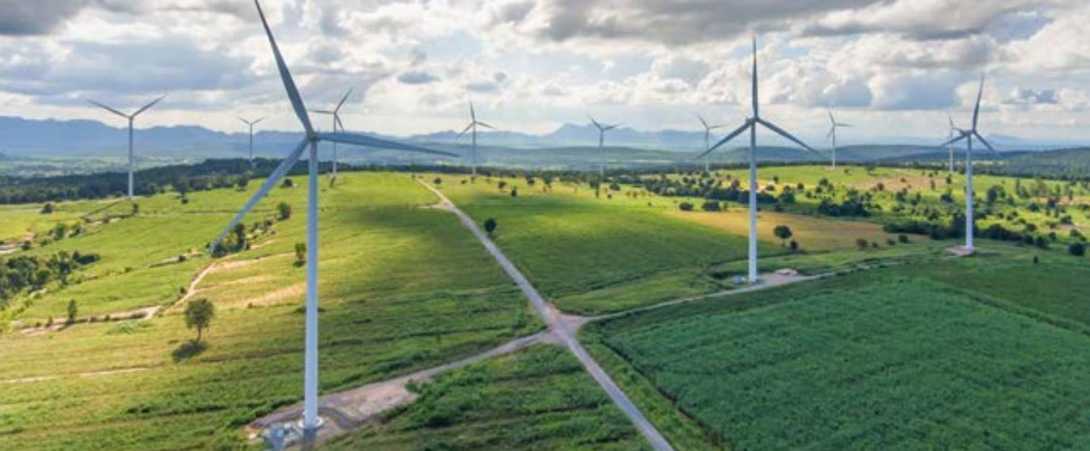
Renewable power accounted for 70% of net additions to global power generating capacity in 2017, the largest increase in renewable power capacity in modern history, according to REN21’s Renewables 2018 Global Status Report (GSR). But the heating, cooling and transport sectors – which together account for about four-fifths of global final energy demand – continue to lag far behind the power sector. The GSR, published today, is the most comprehensive annual overview of the state of renewable energy worldwide.
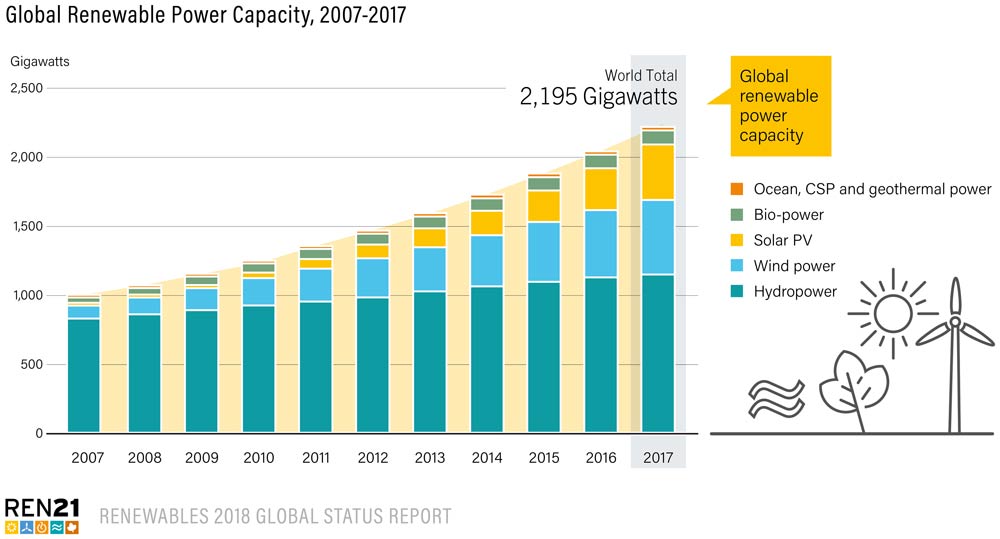
New solar photovoltaic (PV) capacity reached record levels: Solar PV additions were up 29% relative to 2016, to 98 GW. More solar PV generating capacity was added to the electricity system than net capacity additions of coal, natural gas and nuclear power combined. Wind power also drove the uptake of renewables with 52 GW added globally.
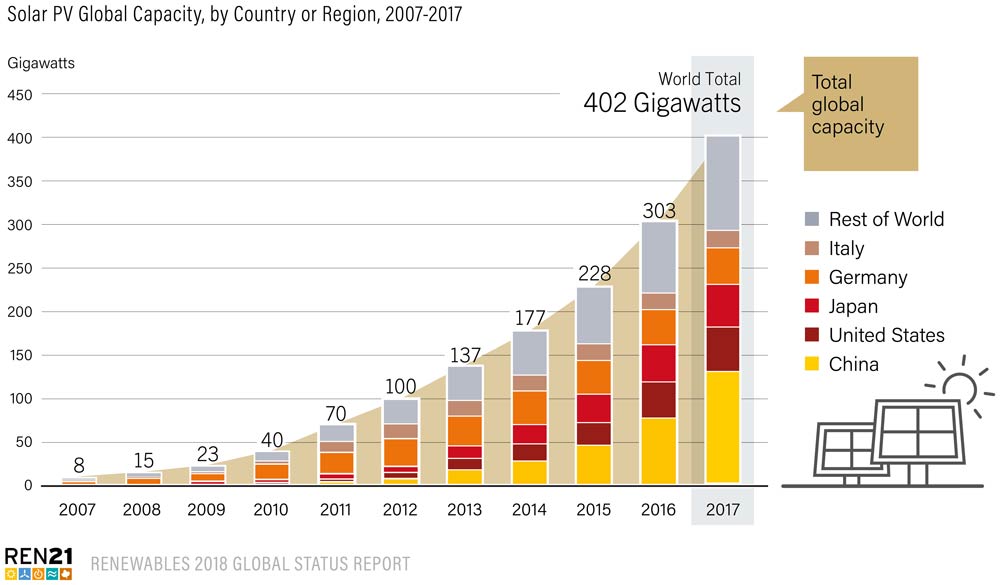
Investment in new renewable power capacity was more than twice that of net, new fossil fuel and nuclear power capacity combined, despite large, ongoing subsidies for fossil fuel generation. More than two-thirds of investments in power generation were in renewables in 2017, thanks to their increasing cost-competitiveness – and the share of renewables in the power sector is expected to only continue to rise.
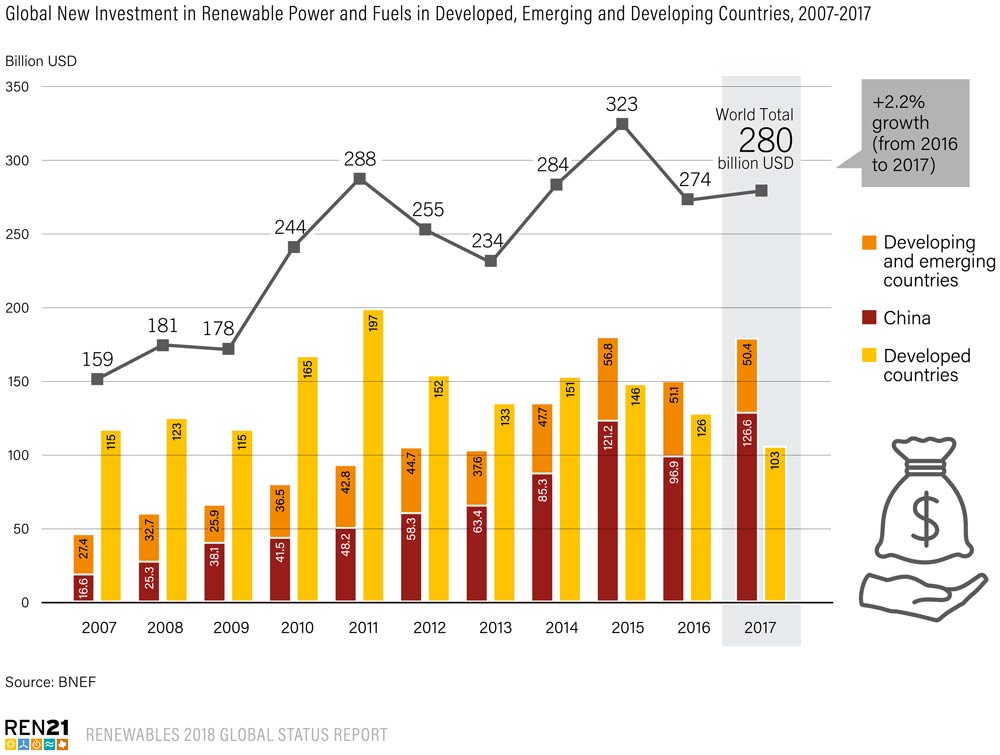
Investment in renewables was regionally concentrated: China, Europe and the United States accounted for nearly 75% of global investment in renewables in 2017. However, when measured per unit of gross domestic product (GDP), the Marshall Islands, Rwanda, the Solomon Islands, Guinea-Bissau, and many other developing countries are investing as much as or more in renewables than developed and emerging economies.
Both energy demand and energy-related CO2 emissions rose substantially for the first time in four years. Energy-related CO2 emissions rose by 1.4%. Global energy demand increased an estimated 2.1% in 2017 due to economic growth in emerging economies as well as population growth. Renewable energy uptake is not keeping pace with this increasing energy demand and the continuous investment in fossil and nuclear capacity.
In the power sector, the transition to renewables is under way but is progressing more slowly than is possible or desirable. A commitment made under the 2015 Paris climate agreement to limit global temperature rise to “well below” 2 degrees Celsius above pre-industrial levels makes the nature of the challenge much clearer.
If the world is to achieve the target set in the Paris agreement, then heating, cooling and transport will need to follow the same path as the power sector – and fast. These sectors have seen:
Little change in renewables uptake in heating and cooling: Modern renewable energy supplied approximately 10% of total global heat production in 2015. National targets for renewable energy in heating and cooling exist in only 48 countries around the world, whereas 146 countries have targets for renewable energy in the power sector.
Small changes are under way. In India, for example, installations of solar thermal collectors rose approximately 25% in 2017 as compared to 2016. China aims to have 2% of the cooling loads of its buildings come from solar thermal energy by 2020.
In transport, increasing electrification is offering possibilities for renewable energy uptake despite the dominance of fossil fuels: More than 30 million two- and three-wheeled electric vehicles are being added to the world’s roads every year, and 1.2 million passenger electric cars were sold in 2017, up about 58% from 2016. Electricity provides 1.3% of transport energy needs, of which about one-quarter is renewable, and biofuels provide 2.9%. Overall, however, 92% of transport energy demand continues to be met by oil, and only 42 countries have national targets for the use of renewable energy in transport.
For these sectors to change, the right policy frameworks need to be put in place, driving innovation and the development of new renewable energy technologies in the sectors that are lagging.

“Equating ‘electricity’ with ‘energy’ is leading to complacency. We may be racing down the pathway towards a 100% renewable electricity future, but when it comes to heating, cooling and transport, we are coasting along as if we had all the time in the world. Sadly, we don’t.”

Rana Adib, Executive Secretary of REN21

“To make the energy transition happen there needs to be political leadership by governments – for example by ending subsidies for fossil fuels and nuclear, investing in the necessary infrastructure, and establishing hard targets and policy for heating, cooling and transport. Without this leadership, it will be difficult for the world to meet climate or sustainable development commitments.”
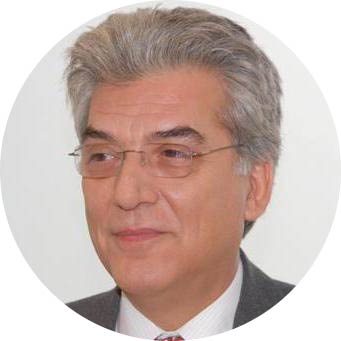
Arthouros Zervos, REN21 Chair
[video:https://vimeo.com/271002513]
The Forum’s closing day, with over 800 attendees present, did not disappoint. On a wide range of issues – energy access finance, bringing clean energy to refugee camps, clean cooking – government leaders, companies, NGOs, and financiers stepped up with new collaborations and commitments to achieve faster results.
Here is a recap of two intensive but productive days in Lisbon where all different players were committed to sustainable energy for all, leaving no one behind.
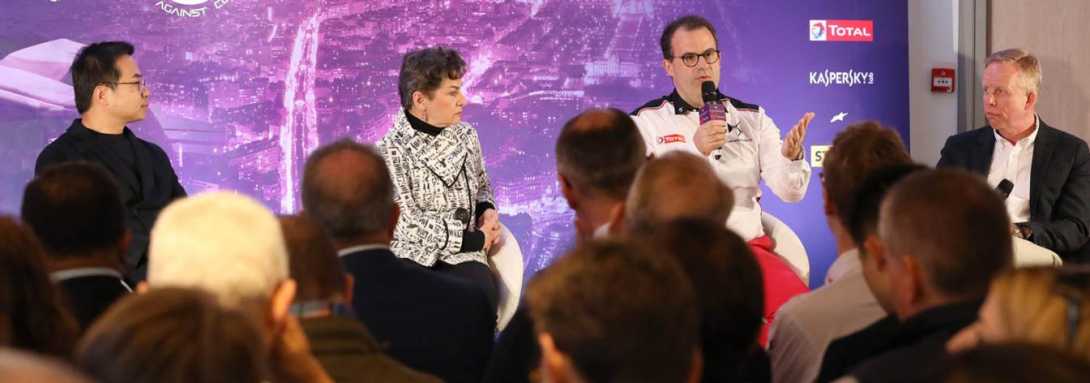
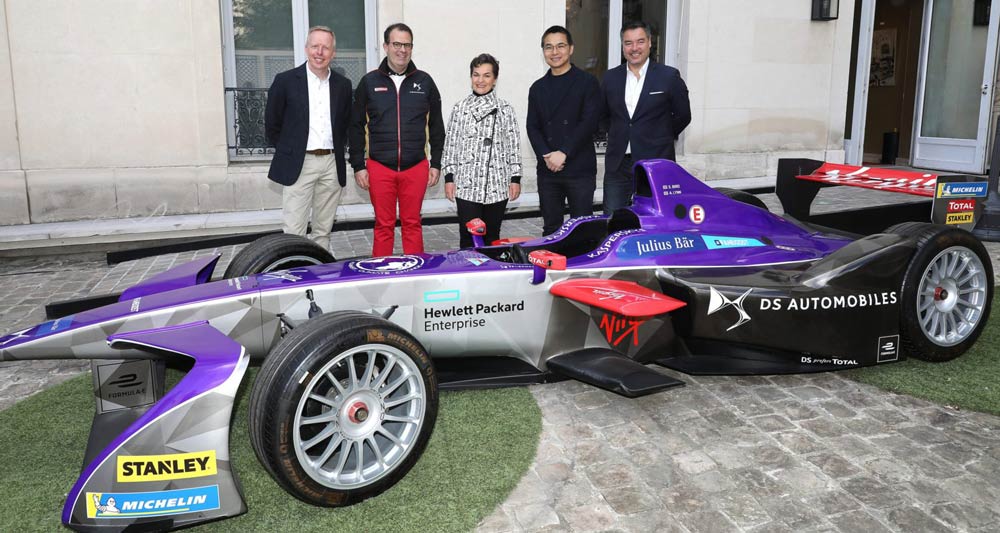



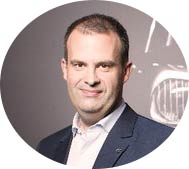

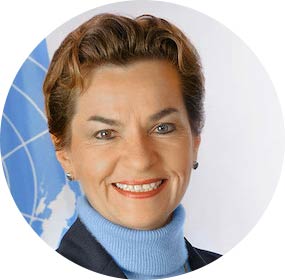


Hosted by the World Bank Group and supported by Italy’s Ministry of the Environment and Energy Security and Germany’s Federal Ministry for Economic Cooperation and Development, Connect4Climate (C4C) is a global partnership for a livable planet that connects, creates, and communicates to build long-lasting change for future generations.